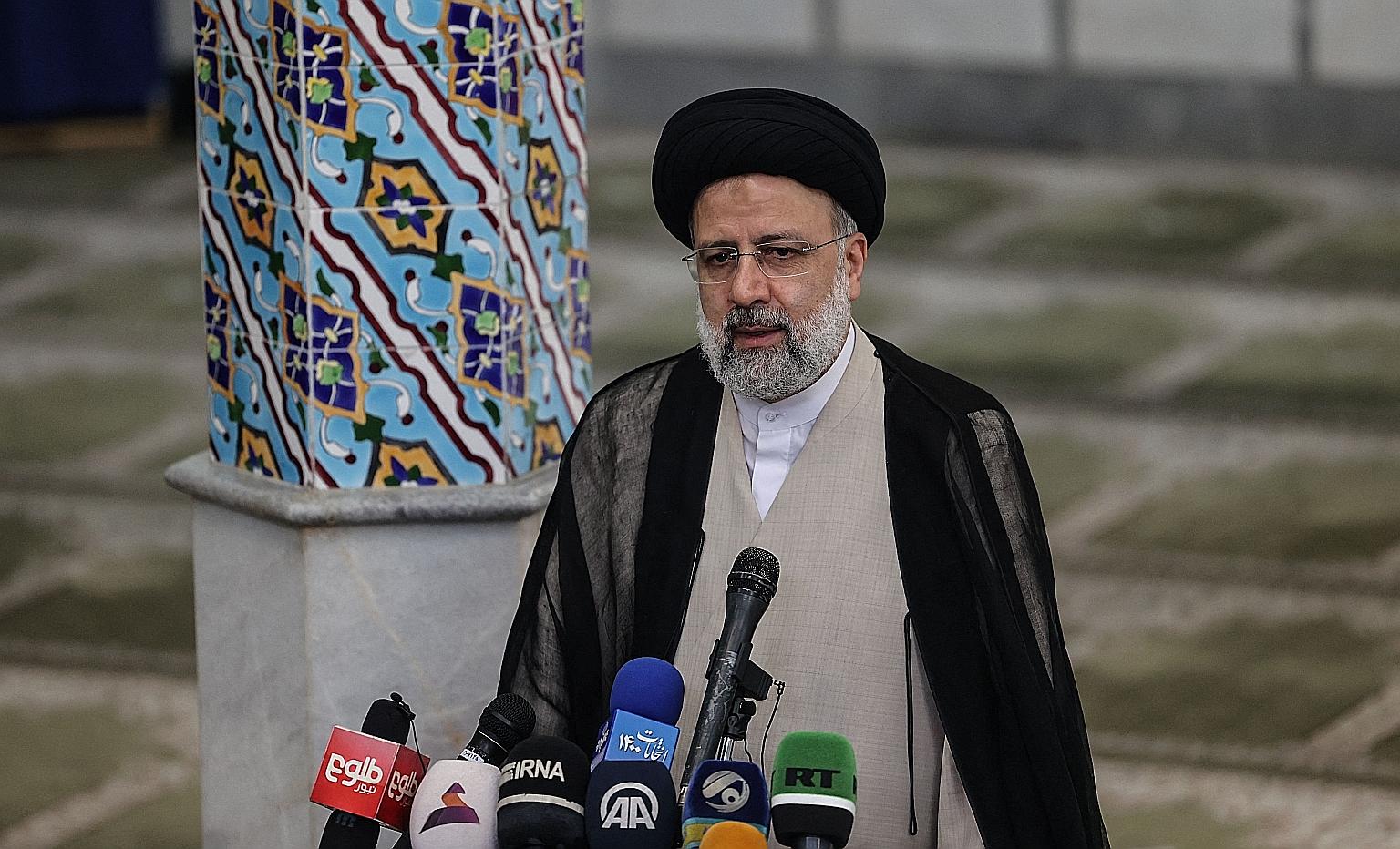Iran elects hardline president, with nuclear deal in balance
His win could hamper efforts to restore 2015 accord, set Teheran on hostile course towards West
Sign up now: Get ST's newsletters delivered to your inbox

Iranian cleric Ebrahim Raisi after voting in the presidential election in Teheran on Friday. Mr Raisi has secured 17.8 million votes, or 62 per cent of the ballots cast.
PHOTO: AGENCE FRANCE-PRESSE
Follow topic:
TEHERAN • Cleric Ebrahim Raisi, an ultraconservative, yesterday swept to a landslide win in Iran's presidential election, a day after millions voted in a contest that critics boycotted over economic woes and political restrictions.
Mr Raisi's victory could set the oil-rich country on a more hostile course towards the West as world powers attempt to revive the 2015 nuclear deal.
He secured 17.8 million votes, or 62 per cent of the ballots cast. The only moderate candidate in the race, Dr Abdolnaser Hemmati, came third with 2.4 million ballots, said Mr Jamal Orf, head of Iran's presidential election headquarters, in a statement.
"We will certainly tap the experience of the current government," Mr Raisi said in a state television address, standing next to outgoing President Hassan Rouhani after the vote's results came in. "I will sit down with the ministers and use their experience and views."
Speaking at a diplomacy forum in the Turkish resort of Antalya, Foreign Minister Mohammad Javad Zarif said Mr Raisi would lead Iran well.
Official figures indicated that the turnout was 48 per cent, the lowest in a presidential vote in the history of the Islamic Republic.
Hoping to boost their legitimacy, clerical rulers had urged people to turn out and vote on Friday, but dissidents inside and abroad said popular anger over economic hardship and curbs on freedoms kept many Iranians at home.
Another deterrent for many pro-reform voters was a lack of choice, after a hardline election body barred most moderate and reformist candidates from standing.
The victory for Mr Raisi, 60, may complicate efforts to restore a landmark nuclear accord that has major implications for Middle East security and global oil markets.
The US' exit from the deal under then President Donald Trump empowered Iran's hardliners and principlists or conservatives, who were always critical of the agreement and won control of Parliament last year.
Earlier yesterday, Dr Hemmati, a pro-reform candidate who stepped aside as Central Bank governor to run for president, congratulated Mr Raisi. "I hope your administration, under the leadership of Supreme Leader Ayatollah Ali Khamenei, will make the Islamic Republic proud, improve livelihoods and ensure the nation's well-being and welfare," media quoted him as saying in a letter.
Mr Rouhani visited his would-be successor in person to congratulate him, according to state TV.
The United States' withdrawal from the nuclear deal in 2018 sent tensions soaring in the Persian Gulf, fuelling regional conflicts and prompting Teheran to abandon constraints on its nuclear programme contained in the pact and to enrich uranium close to the level needed for a nuclear bomb.
An austere cleric deeply hostile to the West, Mr Raisi has been critical of the 2015 nuclear accord, but told voters during his campaign that he intended to preserve it. His election comes as world powers are trying to revive the agreement at talks in Vienna before Mr Rouhani leaves office.
Seen as a favourite to one day succeed Supreme Leader Ayatollah Ali Khamenei, Mr Raisi was sanctioned in 2019 by the Trump administration, which cited his role in a deadly crackdown a decade earlier on protesters alleging vote fraud.
BLOOMBERG, REUTERS

